Interview with Gwyneth Jones
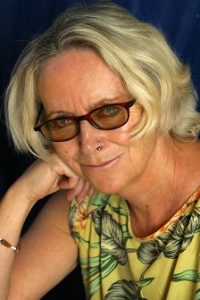 Gwyneth Jones is one of the key science fiction writers of the past couple of decades. Her novel White Queen (1991), a cyberpunk-tinged first contact story, won the first ever James Tiptree Jr Award for its nuanced exploration of gender and sexuality, and is the first book in the Aleutian trilogy. Both it and the second volume North Wind (1994) were nominated for the Arthur C. Clarke Award.
Gwyneth Jones is one of the key science fiction writers of the past couple of decades. Her novel White Queen (1991), a cyberpunk-tinged first contact story, won the first ever James Tiptree Jr Award for its nuanced exploration of gender and sexuality, and is the first book in the Aleutian trilogy. Both it and the second volume North Wind (1994) were nominated for the Arthur C. Clarke Award.
Her novel Bold As Love (2001), first volume in the Bold As Love sequence, won the Arthur C. Clarke Award and was nominated for the BFSA Award and the British Fantasy Award. Depicting the dissolution of the United Kingdom in a climate-change-ravaged near future, it is an intoxicating mix of speculative fiction, Arthurian mythology and rock and roll, that reads disturbingly prescient in today’s volatile and uncertain political climate. Her novel Life (2004) won the Philip K. Dick award. More recently her novella Proof Of Concept (2017) was released by Tor. She has also written young adult novels, many under the pen name Ann Halam.
Gwyneth Jones was at Eastercon in Heathrow to launch her latest short story collection Big Cat with NewCon Press. She was kind enough to speak with The Fantasy Hive.
Your short story collection Big Cat is out now from NewCon Press. Would you be able to tell us a bit about it?
It’s the first story collection I’ve had out since 2011. The stories are from 2007 – I think that’s the earliest one – and the latest one is quite new. And it’s a variety of stories. The lead story is a Bold As Love story.
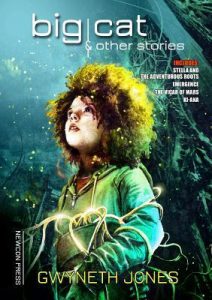 The political concerns of the Bold As Love sequence feel even more relevant than ever now.
The political concerns of the Bold As Love sequence feel even more relevant than ever now.
Yeah. You’ve got to accept that for me, writing in 1999, which was when I first wrote my first draft, it seemed as relevant as it does today. Of course, I hope things won’t go the way they do in Bold As Love. But there’s one thing that, as far as I can see, there’s no way around: the fact that the climate’s going to get into a very poor state. I mean for human beings. I suppose the rest of the life in the world will just bunker down until there are no human beings left and then maybe pop out again.
Climate change and environmentalism is a big theme that crops up in a lot of your writing.
Yeah, I think so. I think you’ll find that in the Aleutian trilogy, it’s not really taken so seriously, it’s not taken as being a real and present danger. But there’s a running joke through the book about what’re really, on the face of it, well-intentioned aliens, who turn up and decide they can fix the whole thing. And they just make things very much worse. So I suppose they are misguided environmentalists.
Climate change also forms a key part of your recent novella from Tor, Proof Of Concept.
Well, for Proof Of Concept, climate change is only part of it. It’s about the enormous burdens that we’re putting on the living planet and it imagines a time when these burdens have become literally unbearable, and the human beings are a remnant. They don’t actually know they’re a remnant because they’re kept apart from each other. And the prognosis is absolutely dire. And that’s the point at which the story begins.
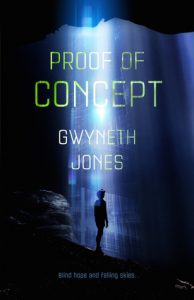 The Bold As Love books are heavily rooted in rock and roll – each one is named after a Jimi Hendrix song or album…
The Bold As Love books are heavily rooted in rock and roll – each one is named after a Jimi Hendrix song or album…
Yes, that goes back a long way to when I was a student at Sussex University, in 1973. And I spent quite a bit of my time with a rather bolshy Irishman and a completely gonzo very tall blue-eyed blonde who really was off this planet. He really is off this planet now, which is sad. But it’s rooted in the rock and roll I listened to at university. And that was not really my choice, not at all. It was just, OK, yeah, it’s pretty good. I was brought up on English folk music. I went to a kind of music-oriented school from when I was 11, and my sister and her friends let me and her friend’s little sister join in. We used to get together to learn to sing English folk songs the way they really should be sung, with no rock and roll. So when I came to write Bold As Love, I was writing about stuff that I liked, but I liked it because it fell my way, not because it had naturally been part of my life. I mean, one of the things about the Irishman, he hasn’t given it up, he absolutely adored the Grateful Dead. I can remember, there was a time at the Alexandra Palace, where we were pinned right up against the speakers, where I do believe I screamed and screamed until he said, all right, we’ll leave! Those were the days when amplified sound was really pretty raw.
The Grateful Dead ties in to the hippy idealism versus the cynicism of the government…
The government in Bold As Love are more clueless than cynical. They think that they can ride this tiger. And as you know – presumably you’ve read the books – they cannot. They’re interested in making themselves look good. But they really are convinced – which is I suppose an improvement on Theresa May – they really are convinced climate change action is the way to go. And they’re asking these people, these rock stars, who are famous, so that makes them obvious good guys. So they get these nearly famous rock stars and ask them to spearhead the government’s counter to the counterculture. It’s as if right now, the UK government started recruiting people like Ariana Grande to be the head of the countercultural organisation that would be the government’s pet, and countering the violence of the real Green movement. But in Bold as Love, they don’t choose somebody like her; they are besotted with someone who’s in far, far more trouble than they could possibly imagine, and that’s Pig Liver. They have no conception; they just think, he’s a rock star. The kids seem to like him. We must recruit him. Let’s take a picture of him. Yeah he’s pretending to fuck a sow in this video. Well, that’s supposed to be cool. Let’s make him our figurehead. I’ve got no idea what he does in his spare time – and that does turn out to be worse than pretending to fuck pigs. (Excuse me – you don’t mind me saying fuck? It’s hard not to when you’re talking about a rock and roll. It’s not really me at all, you know.)
All of your writing is very much engaged with your politics…
Well, I don’t really notice it cause I don’t really know any other way to be. But I was brought up by two political people. My mother and father were Labour activists after the Second World War, and some of my earliest memories were of trailing around with daddy or mummy knocking on doors. It was actually quite pleasant. And you got to see what was in other people’s houses and what they grew in their gardens. And then, when it was an election, everybody went down to the club, Brinkley club, and there was Lancashire hotpot with pickled red cabbage. And that was your reward for doing things that were very nice. So I was inducted early into the idea that politics was normal behaviour. And I think that’s important. I think they were disappointed that after a while I started thinking politics was rubbish and stopped being interested in the Lancashire hotpot and red cabbage. I did vote, but that was it.
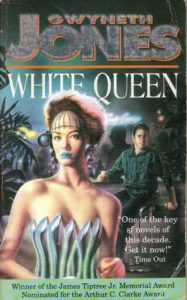 Your writing is also frequently strongly feminist, particularly in White Queen and the other Aleutian books…
Your writing is also frequently strongly feminist, particularly in White Queen and the other Aleutian books…
Yeah. That was kind of inevitable in the 70s. At university, I didn’t like them. The feminists. I thought they were a nuisance. But after university, I became interested because it was what was happening. I’m really bit of a camp follower. I do have principles, I think. I’m sure I do. But it was what was happening around me, and so I got interested, and after a while, having looked at it and got interested I thought, yeah, you know, it’s right. I certainly was becoming an activist and living my young life at this time. And then later, we went to Singapore. And Peter had a job, and I was writing books. And there was this one book, in a Singapore bookstore, it was The Female Man [by Joanna Russ]. I had read some feminist science fiction by then. I walked past it several times and thought, I’m not a man. I’m definitely not a man, I don’t want to be a man. What’s she on about? And in the end I had to buy it. And when I bought it, and read it, I was blown away by her really brilliant style, and the brilliant things she did with the idea that one woman could be four women, and superimposed on each other, like that cat in the box. I would never try to do anything like that myself, but I was really pleased that she’d done it, and I really admired it. And then I read other works, and I got talking to other people, and I ended up sharing the first Tiptree Award for White Queen.
That was where it ended, actually. I’m not sure that the American audience was ready for White Queen. They certainly thought it was pretty weird and out there and maybe not very nice. Maybe it isn’t.
As well as winning the Tiptree Award for White Queen you also won the Arthur C. Clarke Award for Bold As Love…
Yeah, big surprise. I had four shortlist appearances before that. And I thought well, this is what I do, I write shortlist-sized books. Fine. That’s very good. So I was surprised to actually win the award.
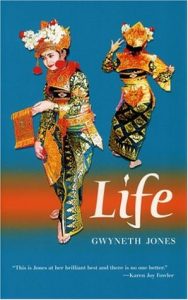 You’ve written books for younger readers under the name of Ann Halam. How do you find writing for younger audiences different from writing for adults?
You’ve written books for younger readers under the name of Ann Halam. How do you find writing for younger audiences different from writing for adults?
I suppose it’s a question of channelling. I was 13 and 12 and 11 and I can remember how it felt. And you just have to decode that and write it in the code of the early 21st century. Because how people feel about growing up is probably quite strongly continuous through time. It’s just different ways it gets expressed and different experiences that people have. But they’re the same thing, which is coming of age, and that’s what I like writing about. And also it was kind of historical, because my mother taught and eventually became headmistress of a infant and nursery school, and she was very keen on the children reading. And I really liked picture books. I did try once to write a picture book with illustrations, but my agent, who’s a lovely person and stayed my agent for a long time and was a real friend, said, you can’t draw, Gwyneth! And your story’s not strong enough for me to send it to somebody else who can draw. So I gave up that idea. And so I moved up and I wrote about my own experience of being a young girl and sort of updated it, and that’s carried me through several books.
When you start off with an idea, do you always know which category it’s going to fall into?
You mean young or adult? Oh yeah. Well, there is a Bold As Love book for adolescents. It’s called The Grasshopper’s Child. I couldn’t get it published, so I published it myself. It’s just been in a story bundle. And I’m very fond of it actually. It kind of bridges a gap. But that’s the young person’s eye view of the Bold As Love world. It’s pretty tough. In the Bold As Love book, though, I have of course the difference in that their government claims to be totally down on climate change and doing everything right, and everybody’s got to be half starved. It’s easy for somebody who was born to people who lived through the Second World War, easy to map that on to the future when you think that, there just isn’t enough to eat. And, an onion – wow! And you just can’t use petrol. So if you’re one of the elite, you can travel in virtuality – you can travel as an avatar, like if someone pops out of your phone and comes in and says, “Jonathan, you’re supposed to be in room 234!” And that’s the kind of world that my adolescents in Grasshopper’s Child live in. It’s harsh, but it’s harsh because I’m afraid it’s either going to be harsh or it’s going to be harsher. Maybe I’m wrong. Maybe people can keep flying to Sri Lanka to their holidays and have a car for every member of the family. OK, try it! There isn’t the political will to say, you’ve got to accept rationing. I don’t know where it’s going to come from. I certainly hope it doesn’t come through the process I describe in Bold As Love.
The new collection is called Big Cat, but you’ve had cats before in Divine Endurance (1984)…
It may surprise you to know that I’m very fond of cats. I started writing Divine Endurance when the cat of my teenage years was still alive, but Divine Endurance became the living spit of my Burmese cat Siang, who lived long enough to see it published. She was a really great cat. Sarcastic, and she would give you a smack, and she did not suffer fools, but she was a great cat. And now I’ve got a Tonkinese cat and a big grey tabby, and they are fond of each other, but they fight.
Reading White Queen today, you have these aspects of cyberpunkish ideas in it, like the guy who has the computer virus…
Yeah. I never really worked that out. As I got older I got much more demanding of myself, and if I wrote a book about somebody having a computer virus now, I would put a lot more effort into it. But as it was, it was a petrovirus, it attacks plastic. Not data, cause that would be silly. It attacks plastic. I just said, ah, he’s got it. It’s worse than AIDS. And he has to be thrown out and banished to West Africa and can’t touch a computer ever again. But he does, of course. It’s very much a Star Wars sort of story in the end. They make their way into the citadel and they destroy the central brain of the enemy, and it costs them a lot.
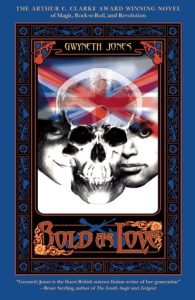 Another striking aspect about the Bold As Love stories is that intermingling of the mythic and the science fictional. Is that something you always wanted to play with?
Another striking aspect about the Bold As Love stories is that intermingling of the mythic and the science fictional. Is that something you always wanted to play with?
Yeah, I think so. When you get into the story of Arthur and the knights and all of that, the phenomenal myth of the sword as being the highest and most perfect form of technology, I think that’s true to the historical roots of the story. Have you ever handled a real sword? They are amazing things, a lot heavier than you would think. I remember watching a programme on television once that showed you where the idea of the sword in the stone comes from. You know when you’re making a sword, the cast, the block that you put the molten metal in and then you pull it out, is a stone. You know how big a sword is, it’s like this high, and then they just pull this thing out, and it’s just fabulously beautiful. And of course deadly too. So that was the template that the medieval writers of the Arthurian cycle were working with. The pitch of technology. And the cutting edge, so to speak, of perfect manhood. Well, it’s got to be a guitar! In a lot of my stories, I’m interested in puns, and in laying one surface over another surface and seeing how they blend together – that, and the Grateful Dead, and Jimi Hendrix, and a lot of misspent time in the 90s in Brighton. There was a club called EXTREEMS which was run by one of the avatars of Ax Preston. And they had everything. The most horrendous ugly punk and the most wispy delicate new age music, like Blancmange, have you ever heard of Blancmange? It doesn’t stand up very well through the years, maybe, but the punk always used to get people in. They’d break the place up, but it did get them in.
What’s next for Gwyneth Jones?
Well, actually that’s quite interesting. In July this year my study of Joanna Russ is going to come out on the Masters of Science Fiction series. And then I’m going to be working with Marcus Gipps at Gollancz. He hasn’t talked to my agent yet so maybe it will get thrown out the window, I don’t know. I stay clear. He’s going to put the first two books of the Bold As Love cycle on the Masterworks list, so they’re going to be republished, which is nice. And there’s a couple of other things which I’ve got which aren’t really solid enough to be plans. But the Joanna Russ thing took a long time. Maybe if you are a real academic you do it in a few weeks, oh, Joanna Russ, there you go, 80,000 words, OK. But for me it was like going down a rabbit hole into this amazing wonderland full of so much stuff from the 60s, the new wave and the 70s feminism, and K/S that became slash fiction, and she was in all these start-ups. And she and Samuel Delany practically invented (this is not quite true; there is somebody else, but I can’t remember his name now, forgive me) practically invented science fiction academia between them, bouncing off each other, and it’s fascinating. And I got there kind of just in time. While I was writing it, Ursula Le Guin died, and Vonda [Macintyre]’s just died, and Suzie Charnas, who said she would help me with it, she couldn’t because she was looking after her husband who was on his way out. So there was a whole generation that came to the end of their careers, and their lives, and I caught them just in time. And made them come back to life again. I hope. Because they were amazing people.
Thank you Gwyneth Jones for speaking with us!
Gwyneth Jones’s latest release, Big Cat: And Other Stories, is available now.

